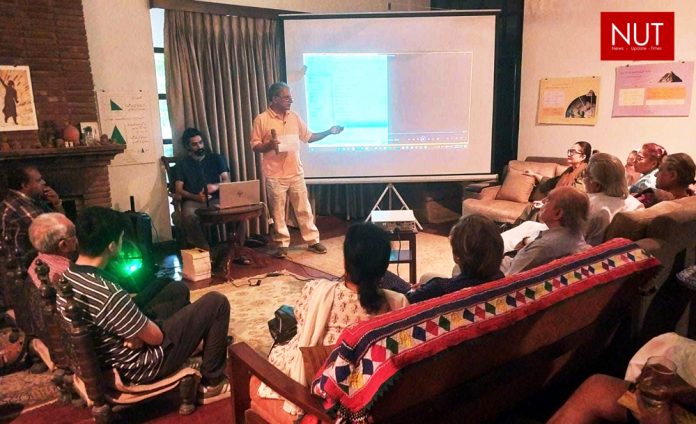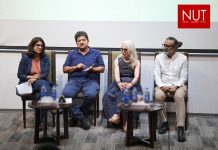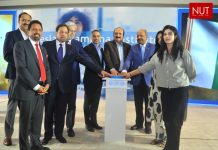Lahore (Muhammad Yasir)
THAAP’s 58th talk was on the book: Nawan Sij (New Sun) A Rock Opera for Children, in Seraiki, presented by Mr Sarmad Khawaja of Zoya Science Schools. Mr. Khawaja explained that Nawan Sij combines several ideas: it is a story of a girl, in eleven songs, who wishes to know how big is the Earth and finds out in Zoya School. The lyrics are by Nawab Muztar, a teacher at Zoya school. Mr. Khawaja said above all, the book is about making the children aware of the socio-cultural realities that shape their lives, and about their capacity to transform these realities. Three video songs on this theme packed with local singing and music talent were presented to the audience who watched with rapt attention. The opera features music from around the world, including Beethoven’s Ode to Joy in the finale. Mr. Khawaja explained how Zoya Schools use posters, videos, and poems to teach abstract math concepts. They take children into the realm of abstraction step by step, starting from the concrete reality where it arose, which is the proper way to teach math. He illustrated this by taking the audience 1,500 years in the past of the northern areas of our country, where modern numbers were invented and commonly used several hundred years before they appeared in the West and showed how concepts such as heliocentrism are best explained by linking them with the everyday lives of the children. In this case with local festivals, such as Poh, which coincide with the solstices.This teaching, he said, produced Pakistan’s Pi champion Hafsa Khan of Zoya Science School Nala Khudaadad. Mr Khawaja said the example set by the eight Zoya schools, which serve over 3,000 underprivileged children, should be a model for addressing the education crisis in the country. He suggested building schools 2 kilometers apart on either side of the Indus river to reach the most neglected children. And giving them hot meals in school and potable water in their homes, as Zoya schools do. Because chronic hunger and diseases severely impact the lives of our children, often with fatal consequences. Therefore, improving the nutrition and health of children must be an integral part of any educational initiative. The talk concluded with a lively question-and-answer session. The audience, including academicians, archaeologists, linguists, and other experts, posed various questions about the Zoya Schools’ work model and their achievements. The host of the evening Professor Pervaiz Vandal thanked Mr. Khawaja for his talk, urging everyone to support Zoya Science Schools’ mission to educate underprivileged children in far and neglected corners of the country.






